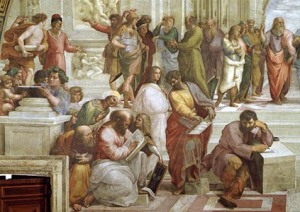Was that the famous quote? Not quite, but maybe it should have been though.
Some of the greatest minds of antiquity understood that decisions made in our every day lives carry over into our spiritual and mental well-being, as well as our physical well-being. A vegetarian or plant-based diet is healthy and sustainable. What’s even better about it is that it decreases the suffering of our fellow creatures. As an individual embarks on a journey of spiritual discovery, it is likely that they will discover the connection of all things. It is inevitable then that they will feel more compassion. The search for the meaning of life and the nature of the universe has a similar result. Great thinkers have given various reasons for their decision to exclude meat from their diets. Despite their differences, their decision was the same.
Let’s take a look at a couple of examples.
Our first example is Plato. Though there isn’t definitive information that Plato was a vegetarian, his famous work The Republic makes a strong case that he was. His interpretation of an ideal society in The Republic reads as follows:
“The work-people will live , I suppose, on barley and wheat, baking cakes of the meal and kneading loaves of the flour. And spreading these excellent cakes and loaves upon mats of straw or upon clean leaves, and themselves reclining upon rude beds of yew or myrtle boughs, they will make merry, themselves and their children, drinking their wine, weaving garlands, and singing the praises of the gods, enjoying one another’s society and not begetting children beyond their means through a prudent fear of poverty or war … We shall also set before them a dessert, I imagine, of figs. peas and beans; they may roast myrtle berries and beech nuts at the fire, taking wine with their fruit in great moderation. And thus passing their days in tranquility and sound health, they will, in all probability, live to a very advanced age and, dying. bequeath to their children a life in which their own will be reproduced.”
He them goes onto describe the fall of the great society in which Mankind is driven by the desires of material wealth and a diet of flesh.
Our next example is that of historian, biographer and thinker; Plutarch. Plutarch was a follower of Plato and adhered to a plant-based diet and an upright moral conduct. His work Moralia contains excerpts explaining his stance on the moral issues with eating meat. For example:
“Can you really ask what reason Pythagoras had for abstaining from flesh? For my part I rather wonder both by what accident and in what state of soul or mind the first man did so, touched his mouth to gore and brought his lips to the flesh of a dead creature, he who set forth tables of dead, stale bodies and ventured to call food and nourishment the parts that had a little before bellowed and cried, moved and lived. How could his eyes endure the slaughter when throats were slit and hides flayed and limbs torn from limb? How could his nose endure the stench? How was it that the pollution did not turn away his taste, which made contact with the sores of others and sucked juices and serums from mortal wounds?”.
Strong statements made with conviction. Plutarch clearly understood the moral implications of eating meat and why it goes against a good code of moral conduct to partake of flesh foods.
Our third and final example of vegetarian philosophers is the great Pythagoras. Pythagoras was a highly influential mathematician, mystic, and philosopher. Pythagoras influenced Plato and in turn all great philosophers afterward. He was most well known for his mathematical theorem which became know as the Pythagorean Theorem. He was a believer in reincarnation which fueled his cause for the vegetarian lifestyle. He felt that animals had souls and that eating them was unethical. While most of what was known about Pythagoras was written by others at a later date, there is plenty of proof of his vegetarianism. Philosopher, Iamblichus said about Pythagorus: “Amongst other reasons, Pythagoras” (says Iamblichus) “enjoined abstinence from the flesh of animals, because it is conducive to peace; for those who are accustomed to abominate the slaughter of other animals. as iniquitous and unnatural, will think it still more unjust and unlawful to kill a man or to engage in war.”
All of these great men, considered to be the greatest minds of their time all had the same sustainable, vegetarian diet in common. They all knew that it is impossible to live a moral life while eating food wrought from murder and suffering. They also understood the health implications of a plant-based diet. These men knew that an ideal and utopian society would be free from suffering for all living creatures. These are only a few examples of the great philosophers that were vegetarian. Check out this article for more information on the topic. Perhaps our world today is the perfect example of what a society based on cruelty and suffering is like. Perhaps if we all lived the lifestyle of these great thinkers, we might actually achieve a true utopia.
